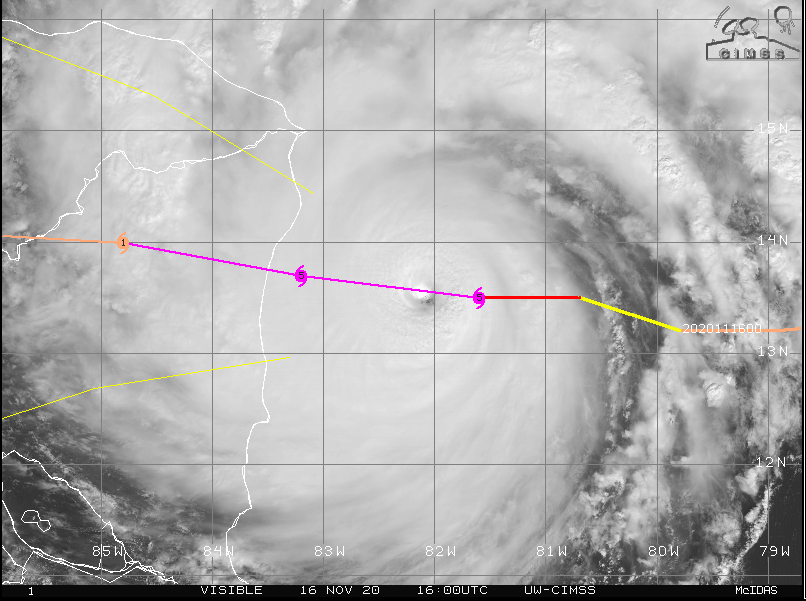This Monday, we woke up to a vaccine that is more than 94% effective against COVID-19, and President Trump refusal to concede to President-Elect Biden. Yet, Category 5 hurricane Iota should be in the headlines as it barrels towards Nicaragua with a pressure of 918 mb and sustained winds of 160 mph. By itself, it would be expected to cause as much damage as hurricane Mitch, but just two weeks ago, Category 4 hurricane Eta slammed into the same region.
Increasing Intensity at landfall — a sign of the future??
Since Hurricane Harvey, Irma, Michael, Maria, and Dorian and how fast they intensified, I have wondered if this is how the future will play out as anthropogenic greenhouse gases warm the oceans. One is often hesitant to say that storms will rapidly intensify as the Earth continues to warm because the science behind rapid intensification is still not clear. However, this year we have seen a number of hurricanes intensifying before making landfall. But given the potential loss of life and property, the conversation is likely to shift for coastal communities, especially in Louisiana. Yes, it is expensive to evacuate coastlines and people feel annoyed and worried about doing so. But, the time will come when coastal communities will have to ponder the unthinkable- moving away from the coast.
For example, Hurricane Iota has gone from a CAT 1 to CAT 4 in about 48 hours. It was pretty disorganized on November 14 but organized itself yesterday in a low shear and warm water environment
I don’t think that it will be some light-switch that will cause this to happen, but probably a series of natural and social factors. The natural factors include coastal flooding, hurricanes, and sea-level rise. The social factors involve safety, rebuilding, and insurance companies that do not want to insure massive losses. In countries that are low-income, the insurance component will matter in low-lying cities but many communities, such as fishing communities may have no choice in the matter. When you have situations, like to ones that happened in Louisiana, Nicaragua, Honduras, and small island states in the Atlantic and around the world, the unthinkable must be pondered by everyone.
Coastal Resilience and Sustaining communities
After Iota and Eta, not only should there be thoughts about how the resilience of coastal communities, but also the often forgotten issue of sustainability. When these monster hurricanes make landfall, they destroy so much leaving waste and debris everywhere. Some of this will go back to the ocean, but lots will go to landfills. That poses an environmental justice problem for poor and communities of color which have a long history of fighting landfills, that is located near their communities.

Look don’t get me wrong about the presidential race, I care but it’s over. We have to move on. The short term pressure point it COVID-19 and how to protect the population before the vaccine is available. With more than 11 million cases and 250,000 deaths, we have to admit that the situation is dire at present in the US. The reliance on a vaccine instead of behavior and the vaccine is a flaw of a free society where choice seems first. Sometimes, you just have to take a clue from the data, go with it, and accept that freedom and responsibility go together.
Rapid intensification is a major challenge that should have been a mid-21st century issue but looks like we’re early and need to rethink coastal resilience and sustainability.
Stay safe and keep Central America in your thoughts and prayers.
